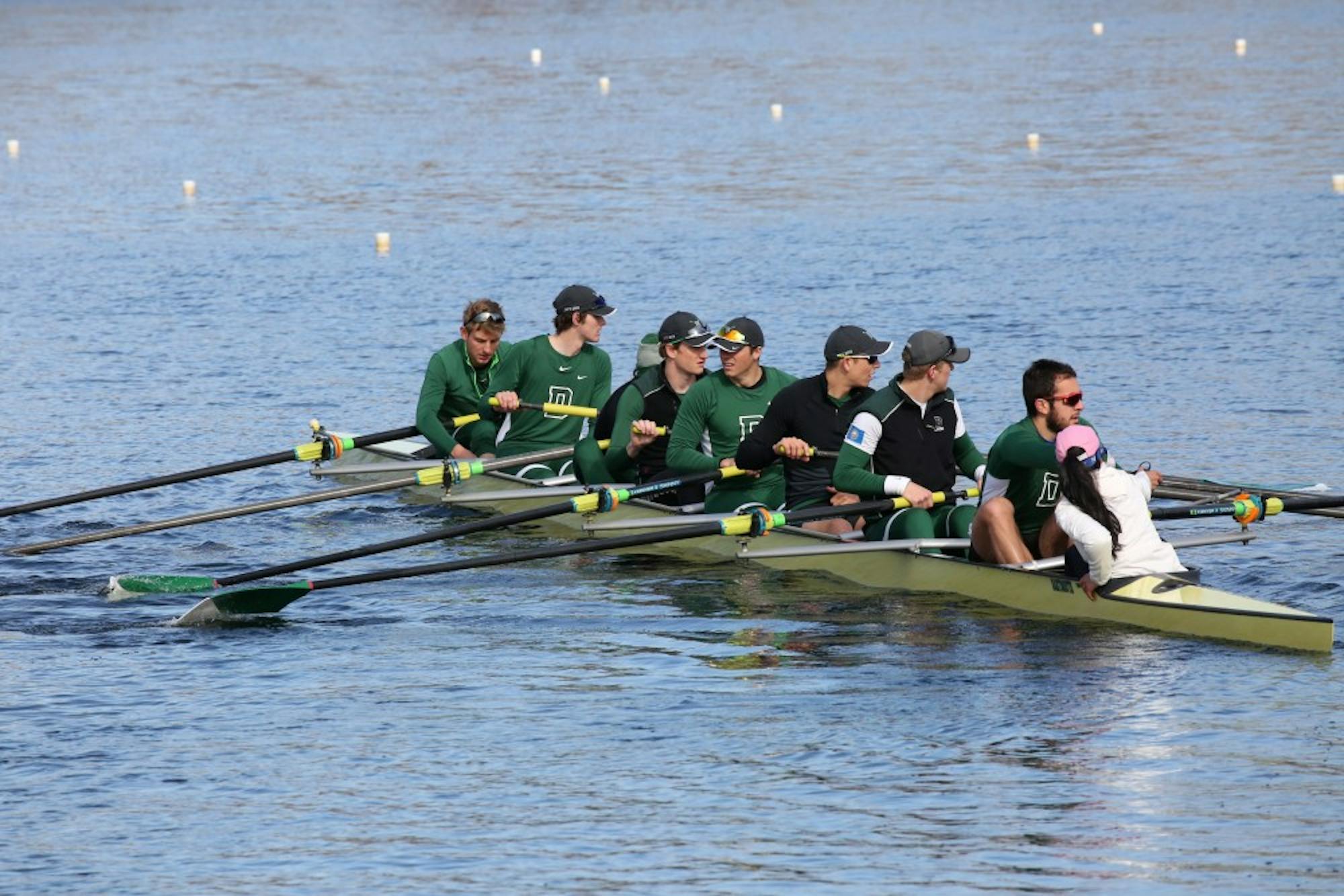This article is featured in the 2022 Green Key special issue.
The men’s heavyweight rowing team has unlocked the key to success in recent years. Since head coach Wyatt Allen joined the program eight years ago, the team has continued to rise in national rankings.
After missing two seasons due to the COVID-19 pandemic, the team has had a dominant season this year, winning three out of its four spring regattas. The team won the Alumni Cup against Holy Cross College, Columbia University and the Massachusetts Institute of Technology on April 2. After losing to No. 1 Yale University at the Olympic Axe Regatta, the team bested Brown University at the Atalanta Cup. Most recently, at a home meet the Big Green beat No. 6 Syracuse University and Boston University at Lake Morey.
The team has come a long way over the past eight seasons under Allen’s leadership. When Allen joined the program during the 2014-15 academic year, the team had a losing record and did not have much history of success. They were ranked at the bottom of the Ivy League and never came close to winning the Intercollegiate Rowing Association National Championships. However, that all changed when Allen decided to come to Dartmouth.
Allen knows how to generate success because of his own accomplishments. He graduated from the University of Virginia in 2001 as captain of the men’s rowing team. In 2004, he represented the United States at the Summer Olympic Games in Athens, where he won gold. Four years later, he returned to the Olympics in Beijing, taking home bronze. He was also U.S. Rowing’s 2004 and 2007 Male Athlete of the Year.
In 2009, Allen accepted his first coaching position at the University of Washington, where he helped the rowing team win a national championship. The next year, he moved to the University of California, Berkeley as a freshman coach for three seasons. He said that he decided to move to Dartmouth from these historically powerful programs because of the team’s potential.
“I was drawn to Dartmouth because it had all the pieces to build a nationally competitive program,” Allen said. “[We have a] great body of water on the Connecticut River, a supportive alumni base fired up about the program and an athletic department that is supportive of the rowing programs.”
According to Allen, the rowers from his first season coaching at Dartmouth were willing to put in the work to raise up the team. Their heavy lifting allowed the program to recruit strong talent for future teams, and this progress has compounded, with current rowers continuing the process by working to bring in talented recruits.
The rowers also credit the team’s success to its inclusive culture. Even on such a large team, the rowers consider themselves friends both in and out of the boathouse.
Coxswain Sammy Houdaigui ’25, who also coxes for the 2021 U.S. Rowing Junior National team, said that he came to Dartmouth because of the strength of the team’s culture.
“The team does everything together, including meals, studying, hanging out and living together,” Houdaigui said. “We are stronger for it.”
And although the team is competitive, they all recognize that they are working towards the same goal.
“The boathouse is a competitive environment, but we are all oriented around a common goal which makes practice easy to come to every day,” Jacob Hudgins ’23 said. “After racing each other in the water, we are all close when we’re done.”
The varsity boat is led by the duo of Hudgins and his brother, Miles Hudgins ’25.
“It’s hard to put into words but when you sit at the start line and you see your blood brother next to you — you get a trust you don’t get anywhere else,” Miles Hudgins said. “Because Jacob missed his first two seasons, it is both our inaugural spring season, which is awesome.”
After two missed seasons, the team hasn’t lost any of its motivation. Miles Hudgins explained that team members are excited to be at practice at 6:30 a.m. and to race after working two years for this season.
During the pandemic, team members had to train on their own during lockdown. Even when team members were not on campus, they kept training with the team’s goals in mind. According to Houdaigui, with COVID-19 restrictions, the team started training more in single boats, which the rowers realized they could use as a new additional training tool.
In terms of success, Jacob Hudgins pointed to the team’s depth. He says there has been significant progress in the lower boats that has pushed the program forward. He added that the team is mentally strong and all the boats are really committed to making the team better.
“Our coaches always emphasize that the team motto is ‘hungry and humble,’” Houdaigui said. “Although we were successful in the fall, we focused on the future because we were not yet satisfied with what we’ve done.”
Houdaigui acknowledges that while the team’s boathouse is separated from the physical center of campus, the team does appreciate the large campus support they receive. The team doesn’t have large home meets, but the support from campus is not overlooked.
This support spurs them in turn to make their alma mater proud as they build on the success enjoyed in recent years.
“Dartmouth guys train and compete with a chip on their shoulder,” said Allen, “[because Dartmouth] doesn’t have the track record of success that the historically top programs have.”




